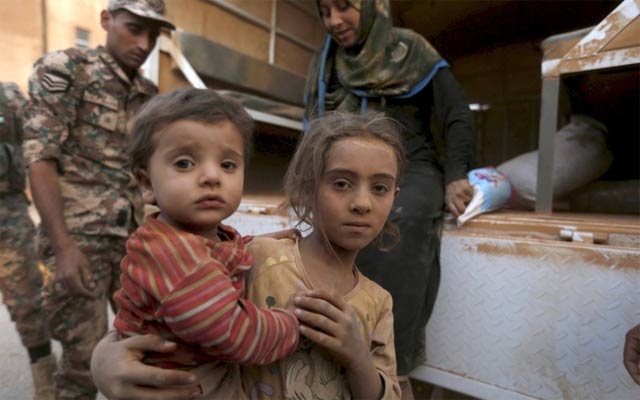
A full 3.7 million school-aged refugee children have no school to go to, the UN refugee agency said in a report.
"This represents a crisis for millions of refugee children," UN refugee chief Filippo Grandi said in a statement, urging international action to get the children back to school.
Malala urges world leaders to act for refugee children
His comments came ahead of the first-ever UN summit on refugees and migrants, to be held in New York on September 19, and which will be followed the next day by a pledging conference for new offers of aid to refugees hosted by President Barack Obama.
"As the international community considers how best to deal with the refugee crisis, it is essential that we think beyond basic survival," Grandi said, pointing out that refugees on average are displaced for about 20 years.
That, he said in the UN report, "is more than an entire childhood."
"Education enables refugees to positively shape the future of both their countries of asylum and their home countries when they one day return," he stressed.
Thursday's report, which compares UNHCR data on refugee education with data from UNESCO on global school enrolment, showed that only 50 per cent of the world's refugee children have access to primary education. That compares to a global average of more than 90 per cent.
"And as these children become older, the gap becomes a chasm," it said, pointing out that only 22 per cent of teens living as refugees attended secondary school. That compares with a global average of 84 per cent.
Refugees and migrants: a crisis of solidarity
As for university, only one per cent of refugees attend, compared to 34 per cent globally, the report showed.
Thursday's report said efforts by UNHCR and others to enrol more refugee children in school were being overshadowed by soaring numbers of newly displaced people.
While the global number of school-aged refugees remained fairly stable at around 3.5 million during the first decade of the 21st century, it has swelled on average by 600,000 children and adolescents annually since 2011, it pointed out.
In 2014 alone, the school-aged refugee population swelled by 30 per cent, UNHCR said, stressing that at this rate an additional 12,000 classrooms and 20,000 teachers are needed each year to cover the refugee needs.
The fact that a full 86 per cent of refugees are hosted in developing countries that are often already struggling to educate their own children complicates things further, Thursday's report said.
More than half of the world's refugee children not attending school live in just seven countries: Chad, the Democratic Republic of Congo, Ethiopia, Kenya, Lebanon, Pakistan and Turkey, it found.
The situation in war-ravaged Syria meanwhile shows how a conflict can quickly reverse positive education trends, the report said.
Malala seeks to raise $1.4 billion to educate Syrian refugees
Before the country's devastating conflict began five and a half years ago, 94 per cent of Syrian children attended primary and lower secondary school.
By June of this year, only 60 per cent were in school, leaving 2.1 million children and teens without access to education, according to UN figures.
At the same time, nearly five million Syrians have fled to overstretched neighbouring countries where access to education is difficult.
The UN estimates nearly 900,000 Syrian refugee children are not in school.





1700590050-0/Rahul-Gandhi-(2)1700590050-0-270x192.webp)

1732089759-0/BeFunky-collage-(75)1732089759-0-270x192.webp)







1734587529-0/Express-Tribune-(1)1734587529-0-270x192.webp)
1734606611-0/Express-Tribune-(8)1734606611-0-270x192.webp)






COMMENTS (1)
Comments are moderated and generally will be posted if they are on-topic and not abusive.
For more information, please see our Comments FAQ